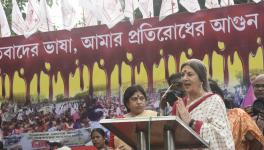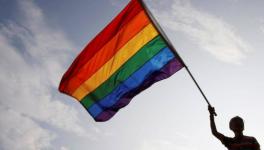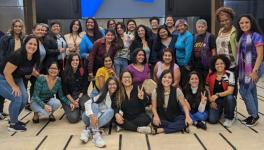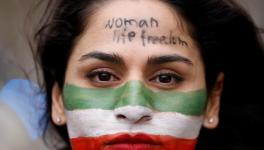Over 500,000 Women, Queers and Gender Dissidents Participated in Historic Encounter
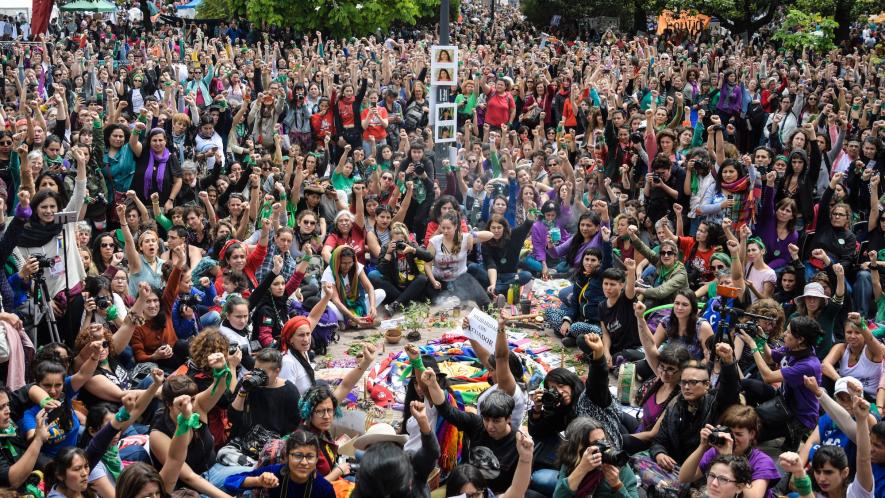
Masses of people gathered for the encounter. Photo: Marcha Noticias
The 34th Plurinational Encounter of Women, Lesbians, Transvestites, Transgender and Non-binary People, which began on October 12 in the city of La Plata, Buenos Aires province, Argentina, concluded on October 14. The event saw the participation of over 500,000 feminists, queers and gender dissidents from across Latin America and the globe.
The annual meeting, formerly known as the National Encounter of Women has been held since 1985 and every year has expanded its political sphere as people of marginalized identities fight for recognition, a voice and political space in the encounters. This year, after a long, uphill battle waged by Indigenous women and gender dissidents, the encounter this year was ‘plurinational and without borders’. The official name change of the encounter was announced on October 14 during the closing ceremony, to the Plurinational Encounter of Women, Lesbians, Transvestites, Transgender and Non-binary People.
The name change is a rejection of colonial borders and the invisibilization of Indigenous identities, nationalities as well as of transvestites, transgender, and non-binary people. The debates on changing the name and synthesizing the common struggle against racism, patriarchy, machismo, colonialism, cis-heteronormativity, capitalism and neoliberalism, began more than two years ago.
The encounter brought together women, queer people and gender dissidents from across the globe to share their experiences and build networks, strengthening the international force of feminism and people’s movements. The encounter saw historic levels of participation of Indigenous, Afro-descendant women, queer people and gender dissidents. There was also an impressive presence of children and young people who ran workshops and held important political debates. This year’s meeting was the biggest in Encounter’s history.
During the first day of the event, more than 100 workshops on a number of feminist, social and political themes were held. These workshops included integral sexual education, feminization of poverty, working class feminism, the rights of imprisoned women, the fight against gender based violence, the importance of ending racism and heteronormativity, self-defense training, building political movements, football and sports, etc.
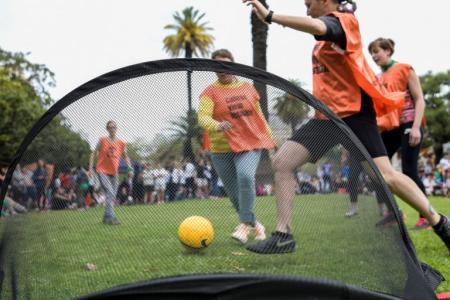
Participants of the Encounter playing football. Photo: Marcha Noticias
The struggles of revolutionary, Indigenous and Afro-descendant women, transvestites, and transgender women such as Marielle Franco, Macarena Valdés, Berta Cáceres, Diana Sacayán and Lohana Berkins, who were killed for defending their identities, bodies and territories, were recalled.
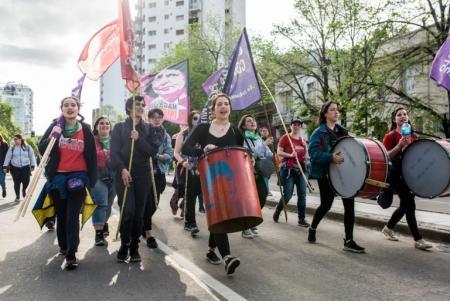
Participants marching with a flag of Berta Cáceres. Photo: Marcha Noticias
On the second day of the event, October 13, a massive mobilization was carried out in La Plata. Hundreds of thousands of people concentrated at the San Martín square and marched for 3 km to the Unique Stadium of the city. The march was painted with feminist colors, purples and greens, and with the rainbow of the LGBTQ community. Women, lesbians and gender dissidents flooded the streets of the city, collectively demanding with greater force the decriminalization of abortion and an end to femicides, trafficking and exploitation of women and LGBTQ people. They also passed through the Government Palace denouncing the budget cuts in policies and programs dedicated to gender equality.
Many also raised slogans against the current Argentine president Mauricio Macri and excitedly cheered for his potential demise in the upcoming elections against Alberto Fernández. Fernández is the presidential candidate of the Frente de Todos -a coalition of center-left parties-, and emerged as a winner in the primary elections held in the country on August 11.
The Revolutionary Daughters of Mother Earth and other Indigenous and territorial organizations also demanded the cessation of extractivism, mining activities, pollution and global warming, a global concerns in recent times and a direct product of capitalism and neoliberalism.
The event saw the participation of the National Campaign for Right to Legal, Safe and Free Abortion, the Ni Una Menos (Not One Less) collective, the Landless Workers’ Movements of Brazil (MST), the Feminist Assembly of Indigenous Abya Yala, the National Organization of Indigenous Women of Peruvian Andes and Amazon (ONAMIAP), the Council of Maya K’iche’ Indigenous People, Kurdistan Women’s Movement, Black Brazilian Women’s Movement, Mala Junta among others.
The next year’s Plurinational Encounter will be held in the city of San Luis. The participants vowed to continue weaving plurinational meetings every year to eradicate the biased, colonial and capitalist system and build a more just and better world.
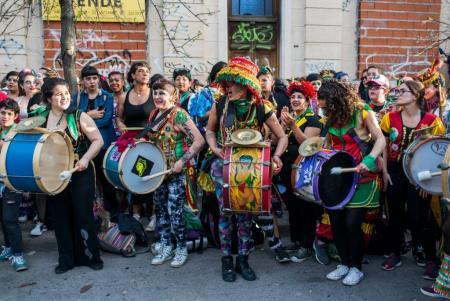
A murga (drum band) present in the march. Photo: Marcha Noticias
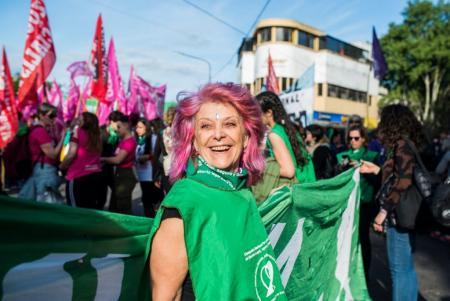
One of the central demands of the feminist movement remains to be the legalization of abortion. Photo: Marcha Noticias
Get the latest reports & analysis with people's perspective on Protests, movements & deep analytical videos, discussions of the current affairs in your Telegram app. Subscribe to NewsClick's Telegram channel & get Real-Time updates on stories, as they get published on our website.












